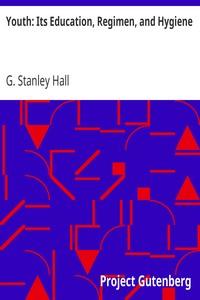Read this ebook for free! No credit card needed, absolutely nothing to pay.
Words: 123050 in 19 pages
This is an ebook sharing website. You can read the uploaded ebooks for free here. No credit cards needed, nothing to pay. If you want to own a digital copy of the ebook, or want to read offline with your favorite ebook-reader, then you can choose to buy and download the ebook.


: Youth: Its Education Regimen and Hygiene by Hall G Stanley Granville Stanley - Adolescence; Educational psychology; Children Health and hygiene Education
Introduction: Characterization of the age from eight to twelve--The era of recapitulating the stages of primitive human development--Life close to nature--The age also for drill, habituation, memory work, and regermination--Adolescence superposed upon this stage of life, but very distinct from it
Muscles as organs of the will, of character, and even of thought--The muscular virtues--Fundamental and accessory muscles and functions--The development of the mind and of the upright position--Small muscles as organs of thought--School lays too much stress upon these--Chorea--Vast numbers of automatic movements in children--Great variety of spontaneous activities--Poise, control, and spurtiness--Pen and tongue wagging--Sedentary school life vs. free out-of-door activities--Modern decay of muscles, especially in girls--Plasticity of motor habits at puberty
Trade classes and schools, their importance in the international market--Our dangers and the superiority of German workmen--The effects of a tariff--Description of schools between the kindergarten and the industrial school--Equal salaries for teachers in France--Dangers from machinery--The advantages of life on the old New England farm--Its resemblance to the education we now give negroes and Indians--Its advantage for all-sided muscular development
History of the movement--Its philosophy--The value of hand training in the development of the brain and its significance in the making of man--A grammar of our many industries hard--The best we do can reach but few--Very great defects in manual training methods which do not base on science and make nothing salable--The Leipzig system--Sloyd is hypermethodic--These crude peasant industries can never satisfy educational needs--The gospel of work; William Morris and the arts and crafts movement--Its spirit desirable--The magic effects of a brief period of intense work--The natural development of the drawing instinct in the child
The view of Groos partial, and a better explanation of play proposed as rehearsing ancestral activities--The glory of Greek physical training, its ideals and results--The first spontaneous movements of infancy as keys to the past--Necessity of developing basal powers before those that are later and peculiar to the individual--Plays that interest due to their antiquity--Play with dolls--Play distinguished by age--Play preferences of children and their reasons--The profound significance of rhythm--The value of dancing and also its significance, history, and the desirability of reintroducing it--Fighting--Boxing--Wrestling--Bushido--Foot-ball--Military ideals--Showing off--Cold baths--Hill climbing--The playground movement--The psychology of play--Its relation to work
Classification of children's faults--Peculiar children--Real fault as distinguished from interference with the teacher's ease--Truancy, its nature and effects--The genesis of crime--The lie, its classes and relations to imagination--Predatory activities--Gangs--Causes of crime--The effects of stories of crime--Temibility--Juvenile crime and its treatment
Change from childish to adult friends--Influence of favorite teachers--What children wish or plan to do or be--Property and the money sense--Social judgments--The only child--First social organizations--Student life--Associations for youth controlled by adults
The general change and plasticity at puberty--English teaching--Causes of its failure, too much time to other languages, subordination of literary content to form, too early stress on eye and hand instead of ear and mouth, excessive use of concrete words--Children's interest in words--Their favorites--Slang--Story telling--Age of reading crazes--What to read--The historic sense--Growth of memory span
Equal opportunities of higher education now open--Brings new dangers to women--Ineradicable sex differences begin at puberty, when the sexes should and do diverge--Different interests--Sex tension--Girls more mature than boys at the same age--Radical psychic and physiological differences between the sexes--The bachelor women--Needed reconstruction--Food--Sleep--Regimen--Manners--Religion--Regularity-- The topics for a girls' curriculum--The eternally womanly
Dangers of muscular degeneration and overstimulus of brain--Difficulties in teaching morals--Methods in Europe--Obedience to commands--Good habits should be mechanized--Value of scolding--How to flog aright--Its dangers--Moral precepts and proverbs--Habituation--Training will through intellect--Examinations--Concentration--Originality--Froebel and the naive--First ideas of God--Conscience--Importance of Old and New Testaments--Sex dangers--Love and religion--Conversion
PRE-ADOLESCENCE
Introduction: Characterization of the age from eight to twelve--The era of recapitulating the stages of primitive human development--Life close to nature--The age also for drill, habituation, memory, work and regermination--Adolescence superposed upon this stage of life, but very distinct from it.
Free books android app tbrJar TBR JAR Read Free books online gutenberg
More posts by @FreeBooks

: Die Erziehung des Menschengeschlechts by Lessing Gotthold Ephraim - Education Early works to 1800 DE Sachbuch







